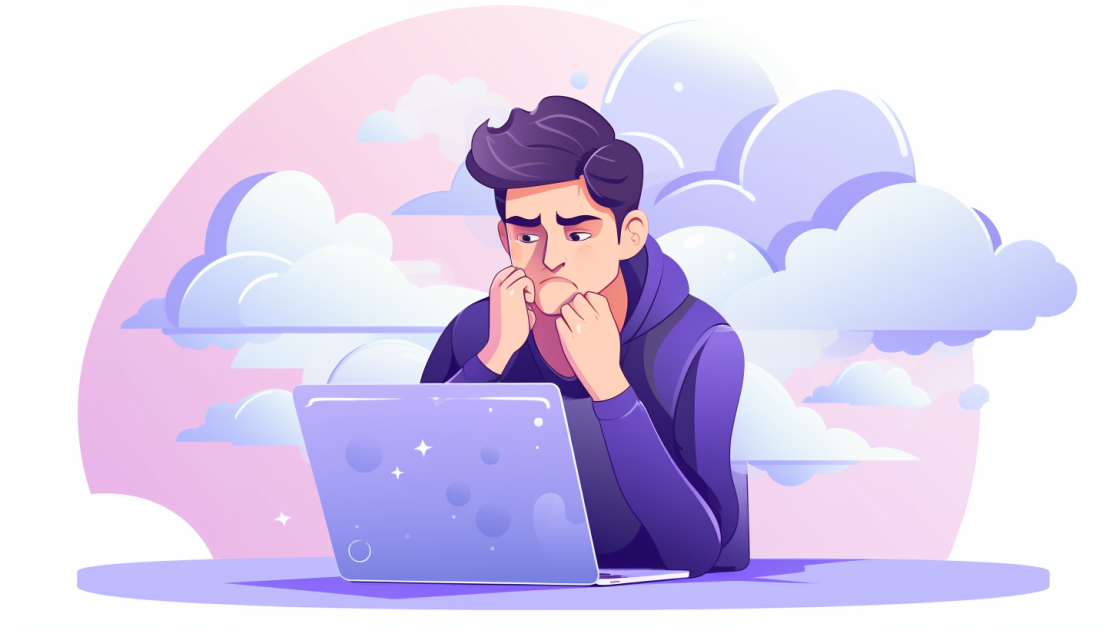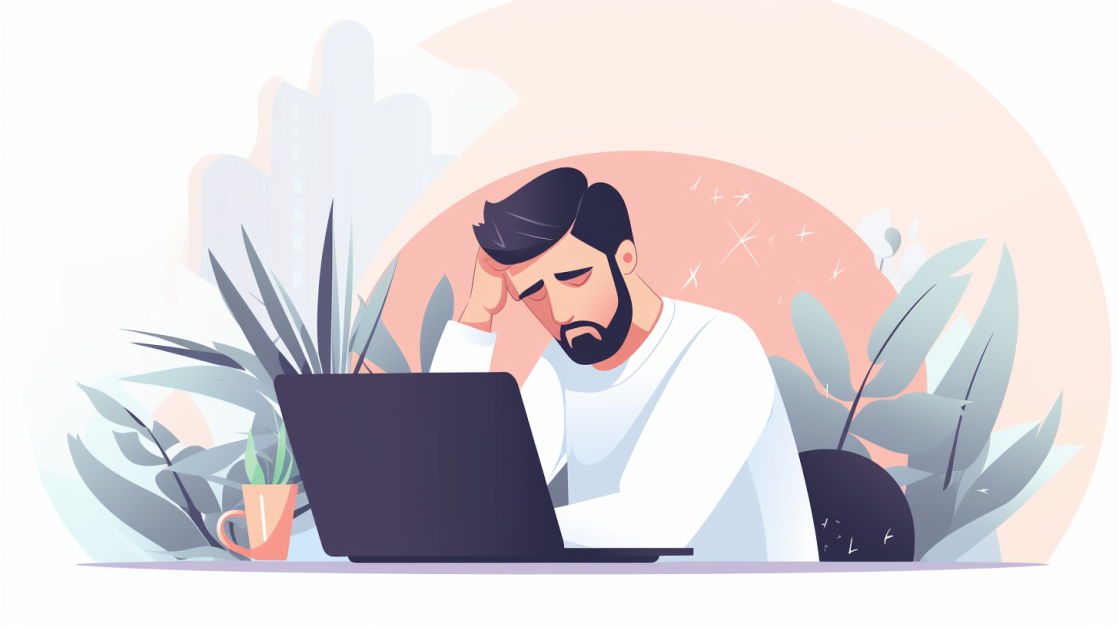How To Avoid Remote Work Burnout

Feeling the weight of burnout while juggling work from home responsibilities? You’re in good company – recent findings from an Eagle Hill Consulting survey has shown that nearly half of working folks are sailing in the same boat.
In this blog, I’m excited to share some proven strategies that have not only helped me keep my sanity intact but also aided countless others in steering clear of remote work exhaustion before it even begins.
Believe me; mastering the art and science of a fulfilling work-from-home life is indeed possible!
Key Takeaways
- Remote work burnout can feel overwhelming and draining, leading to decreased motivation and productivity.
- It’s important to establish clear boundaries between work and personal life to prevent burnout.
- Maintaining social connections, prioritizing self – care, and communicating effectively with your team are essential strategies to avoid remote work burnout.
- Regular exercise, a balanced diet, and a structured daily routine can help prevent burnout.
Understanding Remote Work Burnout
Remote work burnout can feel overwhelming and draining, leading to decreased motivation and productivity. Symptoms may include mental exhaustion, physical fatigue, and emotional changes.
What does it feel like?

Burnout from remote work can feel hard. You might wake up each day feeling very tired, even if you sleep a lot. Work tasks that used to be easy now seem really tough. Maybe you’re often in a bad mood or worried all the time.
Even when not working, your mind keeps thinking about it. It’s like being stuck in quicksand – the more you struggle, the deeper you sink.
What are the symptoms?
Feeling burned out from remote work shows in many ways. You might find that you’re not sleeping well. This could be because your mind is racing or you’re feeling a lot of anxiety. You may feel tired all the time and lack the energy to do things. It’s common to feel easy to anger or more irritable than usual. These signs are all symptoms of remote work burnout.
- Lack of sleep
- Lots of worry or anxiety
- Feeling very tired most days
- Getting upset or angry quickly
The Causes of Remote Work Burnout
Remote work burnout can be caused by several factors, including the lack of boundaries between work and personal life, the potential for overworking, and the isolation and lack of social connection.
The lack of boundary between work and personal life
Working from home makes it hard to separate work and life. At the same time, you live where you work. This mix-up can lead to burnout. You might find yourself working late into the night or answering emails during family dinner time.
It’s hard to turn off when your office is also your living room. Distractions add more stress, making focus feel impossible sometimes. Doing all this every day brings on tiredness that doesn’t go away with rest – a sure sign of burnout.
The potential for overworking
Working from home can make it hard to stop working. You are always near your work. This means you may end up doing more work than needed. It’s easy to keep on working when there’s no need to go home at a set time.
This is not good for your health and mind. Many remote workers face this issue of overworking, leading to burnout.
The isolation and lack of social connection
Working remotely can sometimes feel isolating and disconnected from the social interactions that we usually have in a traditional office setting. The lack of face-to-face interaction with colleagues and limited opportunities for casual conversations can contribute to feelings of loneliness and isolation, which in turn can lead to burnout.
Without regular social connection, it’s easy to feel detached from the team and lose motivation. It’s important to find ways to stay connected virtually, whether through video calls with colleagues, virtual team-building activities, or even reaching out for informal chats.
By prioritizing social connections despite the physical distance, we can help combat feelings of isolation and reduce the risk of burnout.
Strategies to Prevent Remote Work Burnout

Establish clear boundaries between work and personal life, maintain social connections to combat isolation, prioritize self-care by scheduling regular breaks and engaging in physical activity, and communicate effectively with your team to avoid remote work burnout.
Establishing clear boundaries
To prevent remote work burnout, it’s important to establish clear boundaries between work and personal life. This means setting specific working hours and sticking to them. Avoid checking emails or doing work-related tasks outside of these hours.
Create a designated workspace where you can focus solely on work, separate from your living area. Communicate with your team about your availability and make sure everyone understands when you are “off the clock.” By setting these boundaries, you can maintain a healthy work-life balance and prevent burnout.
Maintaining social connections
Maintaining social connections is crucial to prevent remote work burnout. Working from home can be isolating, so it’s important to make an effort to connect with others. Schedule virtual coffee breaks or lunch dates with colleagues, join online communities or professional networking groups, and reach out to friends and family for regular catch-ups.
Building social connections not only helps combat loneliness but also provides a support system that can uplift your mood and boost resilience during challenging times. Research shows that having strong social ties improves mental health and overall well-being, making it an essential strategy in preventing burnout while working remotely.
Prioritizing self-care
Taking care of yourself is crucial when working remotely to prevent burnout. It’s important to set aside time for activities that help you relax and recharge. This can include going for walks or exercising, cooking healthy meals, or practicing relaxation techniques like meditation or yoga.
By prioritizing self-care, you can reduce stress and anxiety levels, improve your overall well-being, and maintain a better work-life balance. Remember to take breaks throughout the day and schedule regular time off to rest and rejuvenate.
Taking care of yourself is not selfish; it’s necessary for your mental health and productivity in the long run.
Communicating effectively with your team
Effective communication is key to preventing remote work burnout. By maintaining open and clear lines of communication with your team, you can avoid feelings of isolation and stay connected.
Regular check-ins, video meetings, and collaboration tools can help ensure that everyone is on the same page and working towards common goals. Sharing progress, discussing challenges, and providing support can boost morale and reduce stress.
Effective communication also helps manage expectations, deadlines, and workload distribution, preventing overwhelm and burnout.
Scheduling regular breaks
Taking breaks throughout the day is essential to prevent burnout. Here are some reasons why scheduling regular breaks is important:
- Breaks maintain productivity and motivation.
- Walking during breaks, especially in nature, can help alleviate stress and provide a mental reset.
- Cooking during breaks can be a therapeutic activity that helps prevent burnout.
- Rewarding yourself for completing tasks can provide motivation and positivity.
- Incorporating relaxation activities, such as meditation or yoga, into breaks can reduce stress and anxiety.
The Role of Physical Activity and Nutrition

Regular exercise and a balanced diet play a crucial role in preventing remote work burnout by boosting energy levels, improving mental well-being, and reducing stress.
The benefits of regular exercise
Regular exercise offers numerous benefits for preventing and combating burnout in remote work. Engaging in physical activity, such as taking a walk or practicing yoga, can significantly reduce stress levels and provide a mental reset.
It increases the production of endorphins, which are natural mood boosters that help alleviate feelings of anxiety and depression. Not only does regular exercise improve our physical health, but it also enhances our mental well-being by promoting better sleep patterns and increasing overall energy levels.
By incorporating exercise into our daily routines, we can effectively manage stress, maintain focus, and prevent burnout while working from home.
The importance of a balanced diet
Eating a balanced diet is crucial for preventing remote work burnout. When we consume nutritious foods, our bodies are better equipped to handle stress and maintain optimal energy levels.
Focusing on whole grains, fruits, vegetables, lean proteins, and healthy fats can help support our mental well-being and overall health. By nourishing ourselves properly, we can feel more energized throughout the day and better manage the demands of remote work.
So let’s make sure to prioritize good nutrition as part of our self-care routine.
The Power of Routine
Creating a consistent daily schedule is essential for preventing remote work burnout.
Creating a daily schedule
Creating a daily schedule is an important strategy to prevent remote work burnout. Here are some tips for creating a schedule that works for you:
- Set specific start and end times for your workday.
- Schedule regular breaks throughout the day to rest and recharge.
- Prioritize your tasks and allocate specific time blocks for each one.
- Include time for self – care activities, such as exercise or meditation.
- Plan enjoyable activities outside of work to give yourself something to look forward to.
- Stick to your schedule as much as possible, but also be flexible when unexpected things come up.
Incorporating relaxation and leisure activities
To prevent remote work burnout, it’s important to incorporate relaxation and leisure activities into your routine. Here are some ideas:
- Take short walks outside, especially in nature. It can help reduce stress and clear your mind.
- Practice deep breathing exercises or meditation to relax your body and mind.
- Engage in hobbies or activities that you enjoy, such as reading, painting, or playing a musical instrument.
- Schedule regular breaks throughout the day to do something fun or relaxing, like listening to music or watching a funny video.
- Set aside time for exercise or physical activity. It can boost your mood and energy levels.
- Spend quality time with loved ones, either in person or through virtual hangouts.
- Plan virtual game nights or movie nights with friends to socialize and unwind.
- Prioritize self – care activities like taking long baths, practicing skincare routines, or indulging in a favorite treat.
The importance of regular sleep patterns

Getting enough sleep is crucial for preventing remote work burnout. Consistently following a regular sleep schedule helps maintain our physical and mental well-being. When we have a consistent bedtime and wake-up time, our bodies can establish a healthy routine that promotes better sleep quality.
This allows us to feel more rested, energized, and focused throughout the day. On the other hand, irregular sleep patterns can lead to fatigue, decreased productivity, and increased anxiety or irritability.
By prioritizing regular sleep patterns and ensuring we get enough rest each night, we can better protect ourselves against the risk of burnout.
The Need for Time Off
Taking time off is crucial to prevent remote work burnout. It allows you to recharge, relax, and rejuvenate. Find out the benefits of vacation time and occasional days off, and how they can contribute to your overall well-being.
Don’t forget to prioritize self-care and make time for yourself outside of work. Discover more about the importance of taking breaks by reading the full blog post.
The importance of vacation time
Taking regular vacation time is crucial in preventing burnout when working remotely. It provides an opportunity to rest, recharge, and rejuvenate both physically and mentally. Vacations help break the cycle of stress and give us a much-needed break from work-related responsibilities.
Even if we are not able to travel or go on exotic trips, taking time off at home can still have significant benefits for our well-being. By stepping away from work and focusing on other activities or hobbies, we allow ourselves to disconnect from the demands of our job and reduce feelings of overwhelm.
Vacation time also allows us to spend quality time with loved ones, engage in leisure activities, and pursue interests outside of work. Ultimately, it promotes a healthier work-life balance and contributes positively to our overall mental health.
The benefits of occasional days off
Occasional days off from work are essential for preventing burnout. Taking time away from work allows us to recharge and relax, which can improve our mental and physical well-being.
It gives us a chance to focus on ourselves, engage in activities we enjoy, and spend quality time with loved ones. Occasional days off also help break the monotony of our daily routines and reduce stress levels.
By taking breaks, we can come back to work feeling refreshed, more productive, and motivated. So remember to schedule occasional days off to prioritize self-care and maintain a healthy work-life balance.
When to Seek Help
Recognizing when burnout is becoming a serious problem can be difficult, but it’s important to prioritize your mental health. If you find yourself experiencing chronic fatigue, irritability, or feelings of hopelessness, it may be time to seek professional help.
Remember, seeking support is a sign of strength and can lead to a healthier and more balanced work-life experience.
Recognizing when burnout is becoming a serious problem
Recognizing when burnout is becoming a serious problem is crucial for our well-being. It’s important to pay attention to physical and psychological signs such as chronic fatigue, irritability, insomnia, and decreased job performance.
We should also consider the impact of work expectations and stressors on our mental health. Loneliness and lack of recognition can contribute to burnout too. Being aware of these symptoms allows us to take action before burnout takes a toll on our overall health and happiness.
The benefits of professional help
Seeking professional help can be incredibly beneficial for individuals experiencing remote work burnout. A mental health professional, such as a therapist or counselor, can provide valuable support and guidance during difficult times.
They can help you process your emotions, manage stress and anxiety, and develop coping strategies to prevent burnout in the future. Professional help also offers a safe space to talk openly about your struggles without fear of judgment or repercussions in your personal or professional life.
Remember that seeking help is not a sign of weakness but rather an important step towards taking care of yourself and prioritizing your mental well-being.
How Can Maintaining a Work-Life Balance Help Avoid Remote Work Burnout?

Maintaining a remote work-life balance is crucial to avoid burnout. Allocating time for both professional and personal commitments allows individuals to recharge and prevent exhaustion. Striking a harmony between work and personal life promotes productivity, creativity, and overall well-being. By setting boundaries, prioritizing self-care, and establishing a routine, remote workers can protect their mental health and maintain a sustainable work-life balance.
Conclusion
To avoid remote work burnout, it’s important to establish clear boundaries between work and personal life. Take breaks, schedule regular relaxation activities, and prioritize self-care.
Maintain social connections and communicate effectively with your team. Remember to reward yourself for completing tasks and seek professional help if needed. By implementing these strategies, you can maintain a healthy work-life balance and prevent burnout in your remote work environment.






